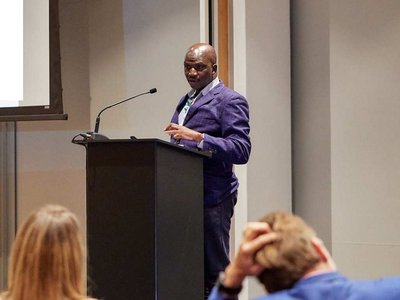

Francis Okori is a doctoral candidate at the Institute of Water Quality and Resource Management, Vienna University of Technology (TU Wien). He also works as an Assistant Lecturer in the Department of Agricultural and Biosystems Engineering, Makerere University, Uganda. His PhD research is embedded in the APPEAR-funded project “Clean and Prosperous Uganda - Fecal Sludge and Solid Waste Management for Improved Livelihoods.”
In September 2024 he had the opportunity to present his research at the International Solid Waste Association (ISWA) World Congress in Cape Town, South Africa. His research assesses the performance and potential improvements of Clean Development Mechanism (CDM) Municipal Solid Waste (MSW) composting plants in Uganda. The study aims to provide actionable recommendations that enhance plant operations and improve compost quality, making MSW composting in Uganda more sustainable and appealing to both commercial and subsistence farmers (see abstract below).
The ISWA Congress brings together professionals, government officials, industry leaders, policy makers, academics and emerging professionals to engage in constructive dialogue to share scientific, technical and technological advances in sustainable waste management. The conference provided Francis a platform for the exchange of diverse knowledge, ideas, techniques and technologies in the field. Engaging with leading global scientists in solid waste management, industry experts, and policymakers created an invaluable opportunity to explore innovative, sustainable waste management solutions with potential for scaling to other regions around the world.
Abstract
In Uganda, Municipal Solid Waste (MSW) mismanagement is a key concern for environmental pollution and public health. To mitigate this, 12 large-scale MSW composting facilities were established in different municipalities through the Clean Development Mechanism (CDM) with World Bank funding. While these improved urban biowaste valorization, several shortcomings exist. This study investigated the performance of CDM facilities by comparing the actual reality of MSW composting in Uganda versus recommended global practices. Results show that manual attempts to remove non-biodegradable materials from mixed MSW, primarily plastics, were ineffective. Finished composts showed low quality, with physical pollutants >2 mm, reaching up to 23.6% by composition. Further, plastic contamination of compost is a serious concern. The facilities do not adhere to recommended composting guidelines with minimal pile turning, inadequate feedstock moisture, partly anaerobic conditions, and incomplete material degradation. Further, there is no regulatory framework governing composting in Uganda, inhibiting supervisory oversights of performance. These should be addressed for sustainable MSW composting.
